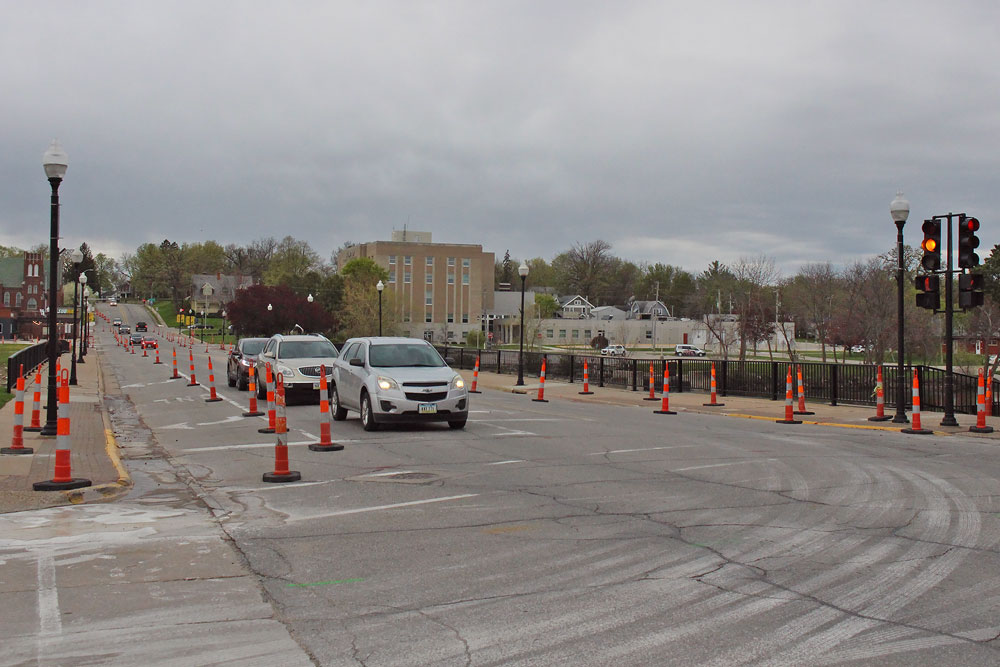EMS officially essential again in Floyd County; supervisors also discuss pipeline ordinance, open meetings law
By Bob Steenson, bsteenson@charlescitypress.com
Emergency medical services are now again officially “essential services” in Floyd County. What that will mean has yet to be decided.
The Floyd County Board of Supervisors passed the third and final reading of a resolution at its meeting Monday morning, declaring EMS “essential for maintaining the health and welfare of its residents.”
Also at the meeting the board agreed to recommend the county Planning and Zoning Commission suspend work on a proposed hazardous liquid pipeline zoning ordinance until the results of federal lawsuits filed against similar ordinances in other counties are known, and passed a recommendation that all county boards and commissions appointed by the Board of Supervisors review the Iowa Open Meetings Law.
The essential services resolution says the declaration will allow a countywide property tax or state income tax surcharge to be collected to support emergency medical services, but before that could happen the tax would need to be approved by at least a 60% majority of county voters.
Passing the essential services resolution makes the tax vote possible, but does not require it. Nor does it set a timetable for when it would need to be put on the ballot. What it does do is start the process of naming a county EMS Advisory Council to study the issue and make a recommendation to the supervisors.
The county went through an identical process up to this point last year under the previous Board of Supervisors. That board decided to take the next step and put the tax issue to a vote, asking voters in the county to authorize collecting up to $556,000 per year for 10 years to support EMS services in the county.
One of the primary drivers of that decision was the continuing increase in the subsidy being charged by AMR ambulance service, with the cost shared between Charles City and Floyd County, and increasing from $150,000 per year to $175,000, to $200,000 in the final year of a three-year contract that ended June 30.
Some of the money raised was also proposed to help support other ambulance services and first responder services in the county.
Floyd County voters turned down the EMS levy at the general election last November, with just 48.2% of the votes in favor of the combination of property tax and sales tax surcharge – not even a simply majority, much less the 60% required to pass.
With the failure of the tax levy referendum, the previous county essential services resolution became void, requiring the supervisors to start the process from the beginning again this year.
Supervisors have said there is even more urgency to do something this year, because the AMR subsidy has more than doubled, from $200,000 annually, split between the city and county, to $415,000 in the first year of a new three-year contract, and increasing 3% per year for the remaining two years.
The Floyd County Medical Center has agreed to contribute $100,000 toward the first year of that contract, but has not committed to additional years’ support.
City and county officials have increasingly said that forming a new public ambulance company may be the best way to meet the county’s ambulance service needs, and an EMS levy, if passed, could be one source of income to support that.
After the essential services resolution passed the final reading Monday, County Auditor Gloria Carr asked if the supervisors had given any thought to who might be appointed to the EMS Advisory Council. That group will examine EMS services and needs in the county and make recommendations to the supervisors for future action, which could include another EMS levy vote.
Supervisor Jim Jorgensen, who is the county’s representative on the Floyd County Ambulance Commission and serves as its chair, suggested that the members of the previous EMS Advisory Council would be a good place to start, but the supervisors took no action on that part of the process.
Also at the meeting Monday, the supervisors:
• Agreed to recommend that the county Planning and Zoning Commission put on hold any action regarding the proposed hazardous liquid pipeline zoning ordinance, that would regulate procedures for granting conditional use permits and locating pipelines in the county, until court proceedings are decided.
A federal judge in the U.S. District Court for the Southern District of Iowa recently granted an injunction against enforcing a pipeline ordinance that had been passed by Shelby County, ruling that pipeline safety matters are the function exclusively of the federal government, and location matters are exclusively the function of the state.
That ruling doesn’t directly effect Floyd County, which is in the Northern District of the U.S. District Court, but similar pipeline zoning ordinances have been passed by Emmet County and Story County, and Summit Carbon Solutions has filed lawsuits against those two counties in the Northern District.
The ordinances were proposed in light of two companies proposing to build carbon dioxide transport pipelines that would include Floyd County, to capture CO2 from ethanol plants and other high-CO2-producing industries, and transport it to North Dakota or Illinois for sequestration in geological formations deep underground.
• Agreed to recommend that all “boards, commissions and advisory councils appointed by the Floyd County Board of Supervisors and drainage district trustees” review Iowa Sunshine Laws training presentation no later than their next scheduled meeting.
The action was prompted by a recent county Planning and Zoning Commission meeting that Supervisor Chair Kuhn said was illegal because it failed to meet the 24-hour advanced agenda posting requirements of the Iowa Open Meetings Law.
• Heard from county Planning and Zoning Commission Chair Dean Tjaden that he had been in contact with County Attorney Todd Prichard regarding questions raised whether commission members who have a financial interest in ethanol plants have a conflict of interest voting on the proposed pipeline ordinance.
Tjaden said Prichard said there is probably not a direct conflict, but there could be the appearance of a conflict and he would advise persons in that position to recuse themselves from voting.
Tjaden said he planned to recuse himself from voting on the ordinance, and asked if any members of the Board of Supervisors had similar interests.
Supervisor Chair Kuhn said the topic was not on the agenda.
“This board is a long way away from having a vote on the pipeline issue. It’s not on the agenda and not appropriate at this time,” Kuhn said, regarding the ethanol plant interest question.
• Scheduled a special meeting for 9 a.m. on Friday, July 28, to take action on a proposal to sell up to $5.1 million in bonds to pay for a new county communications system for law enforcement, fire services and other entities. The Friday meeting will likely take the place of the regular Monday board meeting that would have been held July 31.









Social Share